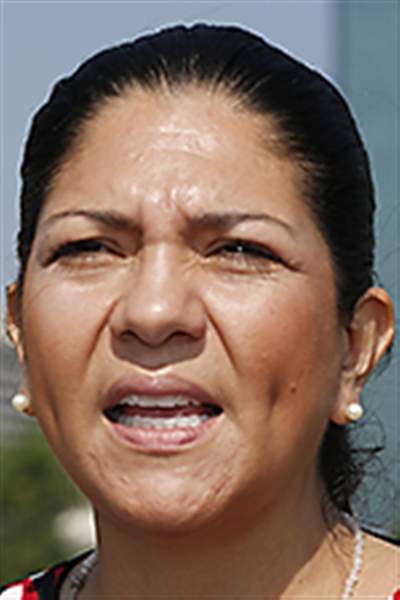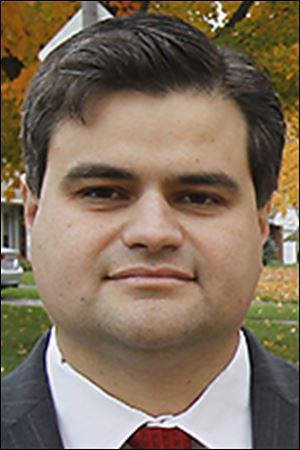
Lopez unveils her economic development plan for city
Candidate wants liaisons to work with businesses
7/21/2013
Lopez
THE BLADE/DAVE ZAPOTOSKY
Buy This Image

Lopez
Toledo mayoral candidate Lucas County Auditor Anita Lopez said her administration would be more friendly and convenient to businesses than past city leaders have offered.

McNamara
If elected, Ms. Lopez promised to streamline city services by hiring up to 10 employees to act as liaisons with businesses within different neighborhoods; create a business hotline; give local companies preference in city procurement polices, and make sure investors are held accountable.
Ms. Lopez, a Democrat, released her two-page economic development plan during a news conference Friday on Riverside Drive in the Marina District in East Toledo, a site that she said cost taxpayers $43 million for cleanup and infrastructure with “almost nothing in return.”
Her two-page plan drew swift criticism from her opponents — incumbent Mayor Mike Bell and Councilmen Joe McNamara and D. Michael Collins.
“If a student offered this plan, they’d send her home for plagiarism,” Mr. McNamara said after reviewing Ms. Lopez’s outline. “Most of these ideas have been copied from my agenda and the ones that weren’t have nothing to do with creating jobs for Toledoans.”
Specifically, Mr. McNamara said he has been promoting local preference for years and in May he wrote legislation to change the city's local preference ordinance with regard to project bids. He said the city now gives a greater allowance to local companies during the bidding process.
“I gave three specific examples and she generalized,” Mr. McNamara said. “Mine our specific examples instead of empty rhetoric, and streamlining services doesn’t necessarily create jobs.”
One of Mr. McNamara’s more ambitious plans is to create “cooperative businesses” that would require initial financial backing from large institutions like the University of Toledo. Based on a model in Cleveland, the cooperative businesses would be placed in low-income communities to aid redevelopment efforts, he said. Residents, who would co-own the businesses, would help determine what businesses are most needed in their community.
Ms. Lopez said she will concentrate on the city’s current businesses.
“The current economic development plan is not working for the city of Toledo and Toledoans. ... My plan is about creating an environment [in which] businesses are able to create jobs,” Ms. Lopez said. “Government does not create jobs. ... Instead of chasing the big fish all over, we must stop ignoring the businesses that have built this city and continue to be loyal to this city.”
Ms. Lopez said her liaisons would be working directly with businesses so they would not have to deal with the city’s water, economic development, zoning, or building permit departments but if business owners wish to interact with those different departments, they will not have to wait in line with the general public.
She was critical of Mayor Mike Bell’s decision to sell 69 acres at the Marina District to Chinese investors without holding them to strict development “benchmarks.”
“Any time we spend a dollar and any time we plan to support any type of entity you will see a strict accountable, viable, transparent plan,” she said.
Dashing Pacific Group Ltd., a group of Chinese investors, in 2011 paid the city $3.8 million for the vacant Marina District property and $2.15 million for the Docks restaurant complex — both in East Toledo. The Marina District deal came with a "conditional repurchase option" five years after the sale if the property had not been developed. Mayor Bell negotiated the deals and Toledo City Council approved the sales.
Ms. Lopez said the five years was too long and she would have favored requiring benchmarks of up to 12 months after such a sale.
More than 12 years of planning, promises, and $43 million of public money went into the east side property before Mr. Bell was even a candidate for mayor four years ago.
Several development plans were announced and crumbled during the Ford and Finkbeiner administrations.
The Dashing Pacific investors did not ask for any public support or tax abatements.
During Mayor Bell's tenure, the administration negotiated with the the Great Lakes Historical Society to move its museum and research library from Vermilion, Ohio, to the Skyway Marina and marine passenger terminal, and the Great Lakes freighter Col. James M. Schoonmaker was moved to the Marina District shoreline.
Also, the decommissioned Toledo Edison Acme power plant just to the north of the 69 acres that Dashing Pacific owns was razed under Mr. Bell's watch, with the exception of three smokestacks he wants to preserve.
City spokesman Jen Sorgenfrei also pointed out that the $43 million had been spent before Mr. Bell took office and that the money paid to transform the former polluted industrial property into “shovel-ready” land for residential, retail, and commercial development.
Mr. Collins said Ms. Lopez’s plan would create more bureaucracy.
“Based upon what I have been told of her plan I can merely say this is the antithesis of streamlining,” Mr. Collins said. “It's creating new layers of bureaucracy. Repetition and duplication is unacceptable.”
Ms. Lopez said during her first 100 days in office she would: revise the procurement policy for the city, establish a business hotline, appoint a business advisory committee, activate a one-stop Internet portal for businesses, hire the business liaisons, and design a training program for “outward-facing staff focusing on improving business services.”
Contact Ignazio Messina at
imessina@theblade.com
or 419-724-6171.